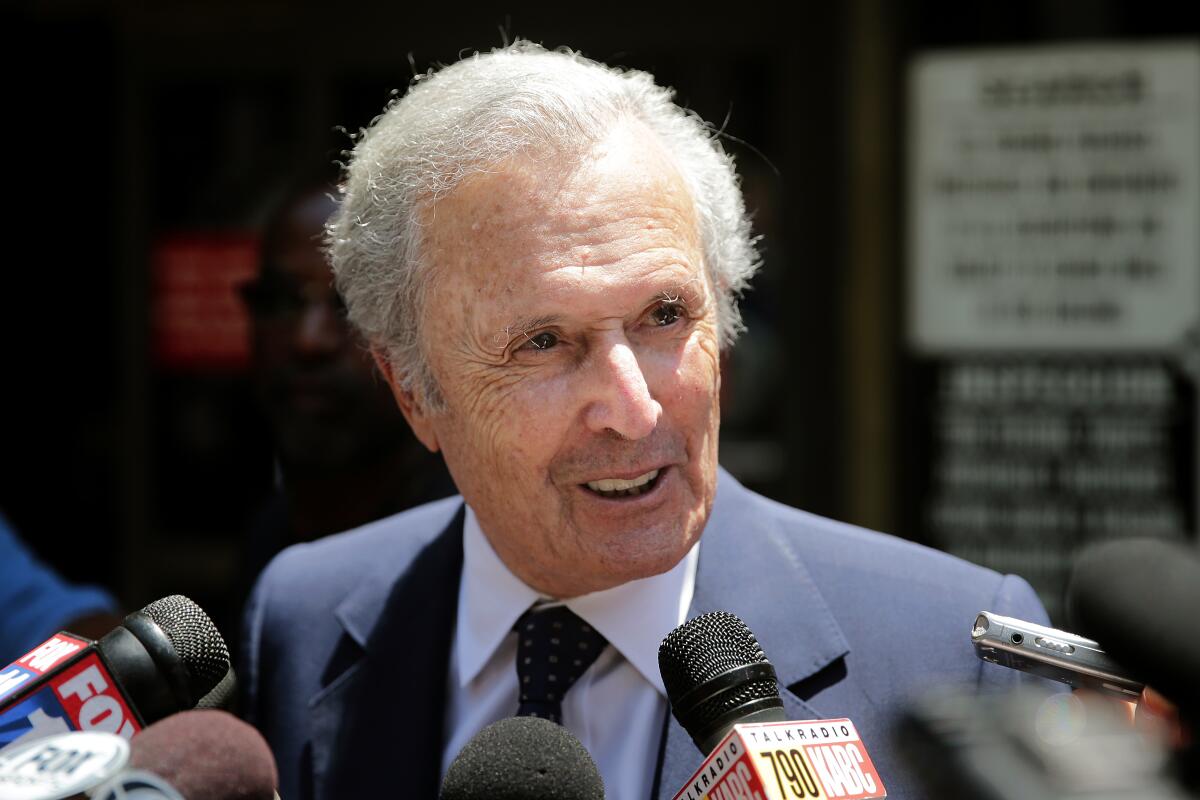Top Hollywood lawyer Bert Fields dies at 93 after COVID battle

- Share via
Bert Fields, the prominent and feared Hollywood litigator who represented such stars as Tom Cruise, Dustin Hoffman, Michael Jackson and Mel Brooks, died Sunday. He was 93.
The Greenberg Glusker Fields Claman & Machtinger attorney died at his Malibu home in the presence of his wife, Barbara Guggenheim, a spokesman confirmed in a statement Monday. He died of complications stemming from long COVID, the spokesman added.
Fields fought landmark entertainment industry cases including George Lucas’ contract negotiations over the rights to certain attractions at the Walt Disney theme parks, and in the late 1980s he represented Paramount Pictures in its legal battle over the movie “Coming to America.” He successfully won a multimillion-dollar judgment for George Harrison against the Beatle’s former business manager.
“For forty years, we were graced with Bert’s brilliance, decency, and charm,” Bob Baradaran, managing partner of Greenberg Glusker, said in a statement. “Bert was a beloved colleague, friend, and mentor who trained a generation of outstanding lawyers.”
Known for his unflappable and relentless style in court, Fields defended studio executives and stars and regularly made top attorney lists.
Fields represented DreamWorks SKG and Steven Spielberg, and beat an injunction against exhibition of the movie “Amistad.”
In addition to DreamWorks, his client list included studios like MGM and United Artists, as well as filmmakers such as James Cameron, Mike Nichols and Joel Silver.
He also represented famous musicians including Van Morrison, the Beatles and Michael Jackson, whom he defended against allegations in 1993 that he had molested an underage boy. The case was settled for more than $20 million with Jackson admitting no wrongdoing.
One of his highest-profile cases involved representing media mogul Jeffrey Katzenberg in his $250-million lawsuit against Walt Disney Co. for a slice of profits from such hits as “The Lion King” and “The Little Mermaid.” The case settled for an undisclosed amount in 1999.
Fields’ aggressive questioning inflamed then-Disney CEO Michael Eisner, who admitted that he had once belittled Katzenberg, telling the co-author of his autobiography, “I hate the little midget.”
In an interview with the New Yorker in 2006, Fields revealed the way he honed his craft: “If I were a general, I would attack, and keep pressing the attack—to throw the opponent off balance, to change the odds and make a settlement your way much more favorable. ... It forces the other side to think, Hey, I may lose this case. Let’s settle it.”
In his legal battles with studios, Fields earned a reputation as a fearsome, win-at-all-costs litigator on behalf of numerous famous clients.
In one high-profile case, he battled Paramount Pictures to protect writer-director Elaine May’s final cut on the 1976 movie “Mikey and Nicky.”
“He was what you always thought Perry Mason was,” May told the New Yorker in 2006. “He did everything, and he did it without pay because I had no money. I paid him, finally, a year later, but he didn’t know I would.”
Paramount settled the case. A few years later, Fields successfully clashed with the same studio on behalf of Warren Beatty, when the director of “Reds” balked at cutting four minutes from the movie.
After his passing, longtime clients expressed their appreciation for Fields.
“Bert Fields was a gentleman; an extraordinary human being,” said Cruise in a statement. “He had a powerful intellect, a keen wit, and charm that made one enjoy every minute of his company. I loved him dearly and always will.”
Fields’ reputation was bruised in 2006 when he became embroiled in the trial of controversial private detective Anthony Pellicano.
In 2008, Pellicano was sentenced to 15 years in prison for illegal wiretaps and for running a criminal enterprise. Fields was questioned by federal investigators about his use of Pellicano in his legal practice. He denied knowledge of any illegal activity.
Fields, also known as Bertram, was a prolific author, having written books about King Richard III and his depiction as the villainous English ruler and about whether Shakespeare authored the plays for which he is credited.
“There was no such thing as idle time in Bert’s world — an author of multiple books, a ballroom dancer, a singer, a chef, a Shakespearian expert and, of course, a fantastic lawyer,” said Dustin Hoffman in a statement. “He was a brilliant renaissance man…and, yet, he still had time to be an incredible, kind friend.”
Fields was born March 31, 1929, in Los Angeles. A magna cum laude graduate of Harvard Law School, he also edited the prestigious Harvard Law Review.
He served in the U.S. Air Force during the Korean War. He then started practicing law and taught at Stanford Law School and lectured at Harvard.
Fields also had a turn on the small screen, featuring in an episode of “Dragnet” as a prosecutor.
After law school, he married his college sweetheart, Amy Markson, with whom he had his only child. They later divorced.
In 1955, the litigator met his second wife, fashion model Lydia Menovich, while working in a Beverly Hills law firm where he was handling her divorce. She died of lung cancer in 1986.
Years later, Michael Ovitz attempted to set up Fields with his close friend Guggenheim, but the lawyer didn’t like blind dates. Nonetheless the pair met in 1990 and were married in 1991.
Fields is survived by his wife, a renowned art consultant, as well as his son, James Elder Fields, and grandchildren Michael Lane Fields and Annabelle Fields.
More to Read
Inside the business of entertainment
The Wide Shot brings you news, analysis and insights on everything from streaming wars to production — and what it all means for the future.
You may occasionally receive promotional content from the Los Angeles Times.











